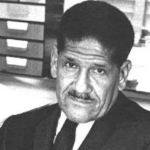Now comes the evening of the mind.
Here are the fireflies twitching in the blood;
Here is the shadow moving down the page
Where you sit reading by the garden wall.
Now the dwarf peach trees, nailed to their trellises,
Shudder and droop. You know their voices now,
Faintly the martyred peaches crying out
Your name, the name nobody knows but you.
It is the aura and the coming on.
It is the thing descending, circling, here.
And now it puts a claw out and you take it.
Thankfully in your lap you take it, so.
You said you would not go away again,
You did not want to go away—and yet,
It is as if you stood out on the dock
Watching a little boat drift out
Beyond the sawgrass shallows, the dead fish ...
And you were in it, skimming past old snags,
Beyond, beyond, under a brazen sky
As soundless as a gong before it’s struck—
Suspended how?—and now they strike it, now
The ether dream of five-years-old repeats, repeats,
And you must wake again to your own blood
And empty spaces in the throat.
















Comment form: